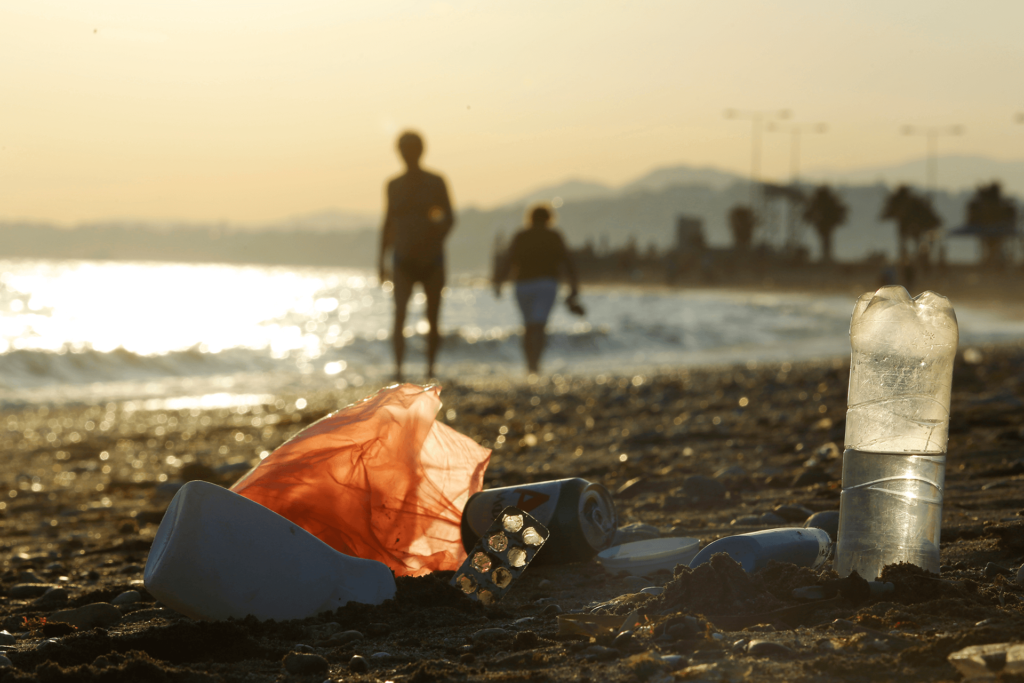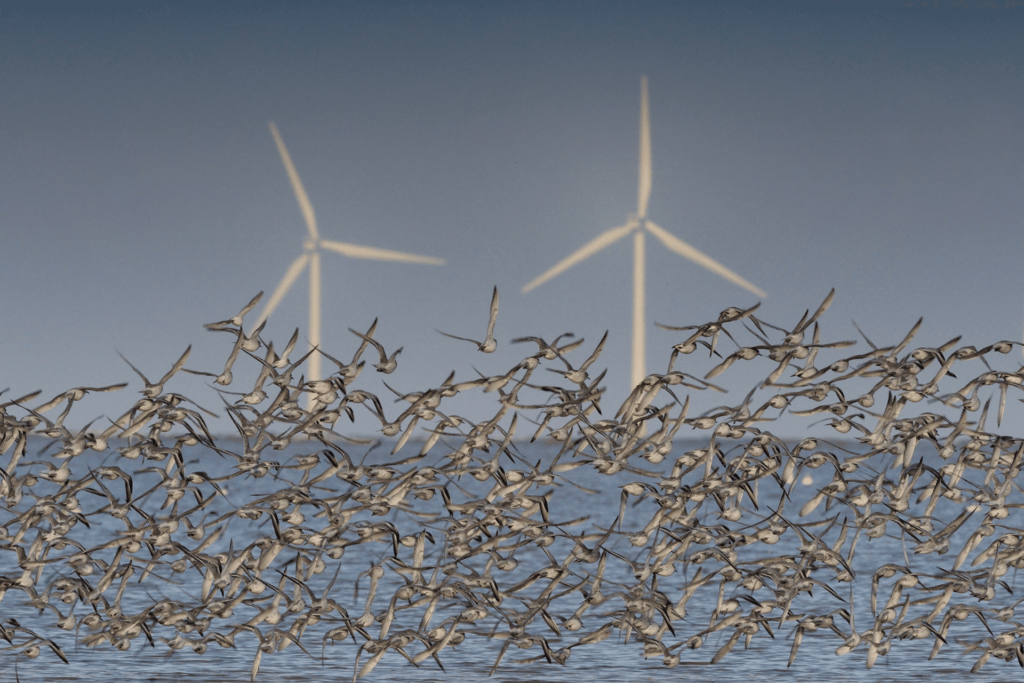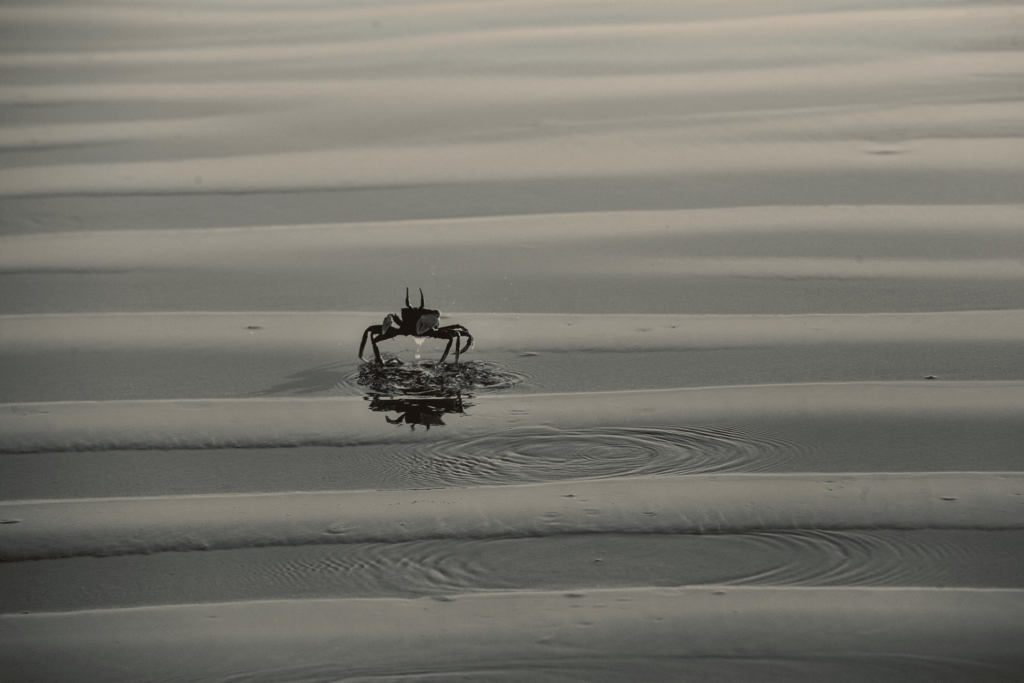A Silent Blue Tsunami
It’s time to account for the invisible climate catastrophes on the horizon.
Have you ever experienced, when visiting a childhood playground, a stark difference between the place you remember and the space now in front of you – where a meadow, forest, riverbank or beach that was once abundant with plant and animal life now feels quiet and empty? This happened to me on a recent visit to my grandparents’ home in the French Mediterranean. As we used to do every day, I decided to walk to the beach and visit the crabs who coat the rocks in the same kind of remarkable way sand shimmers in the sunlight. As we would climb the rocks, hundreds of crabs would rush out of our way. We had to be extremely fast to catch them, competing to see who could collect the most in their bucket. At the end of the day, we would release them. But returning to these same rocks years later, I was shocked to find no crabs at all.
Declining biodiversity
Science now unequivocally backs up experiences like these: globally, populations of mammals, birds, amphibians, reptiles, and fish have decreased by 68% in the last 46 years. This casts a dark shadow of doubt in my mind: how can future generations fight and protect nature if there are elements of that nature they have never seen, like the crabs now missing from my childhood beach?
Human reference points are based on culture and memory, in addition to those documented by science. This phenomenon, known as “Generational Environmental Amnesia”, means each generation comes to understand its surroundings as a normal frame of reference. In political terms, this perspective can have serious consequences: acclimatizing to landscapes that reflect catastrophic degradation of nature makes us unable to grasp the extent of the collapse we need to reverse. So how do we protect something that is invisible?

This question is especially true for 71% of the planet: the area covered by our ocean. From our shorelines or standing on the decks of boats, we cannot really see what is going on beneath the surface or on the distant high seas – our vast ocean and the depths of its history are, in many ways, invisible to us. The data we do have indisputably shows that our seas are in poor health, with wildlife populations and habitats heavily damaged or close to collapsing. But how many people (and how many politicians) have experienced this loss firsthand and feel a personal sting?
Getting ‘blue’ into what’s ‘green’
Current policies are inadequate to successfully restore and protect our blue planet. While today there are more environmentally-focused policies, ocean issues have too often been postponed to the next round of talks, all while hurricanes, typhoons, heatwaves and other extreme events multiply in quantity and intensity. Our ocean has a direct role to play in mitigating these catastrophes: in the last 40 years, more than 90% heat produced from humanity’s greenhouse gas emissions have been stored in the ocean. Its capacity to continue as our ally for climate action, as a source of oxygen, nutrition and as an irreplaceable source of spiritual connection now hangs in the balance. Hopefully, the unanimous adoption of the Lisbon Declaration, “Our ocean, our future, our responsibility” by over 150 countries at the 2022 UN Ocean Conference means we’ll see radical action to address the linked crises of climate change and declining ocean health in the months ahead.
To turn the tide, we must fully integrate ‘blue’ into ’green’ policies. Here in Europe, the EU has proposed a world-first law to restore nature by at least 20% by 2030. If it comes into force, the law will see marine habitats more embedded than in any other EU regulation. While this is pioneering at a global level, unless countries are legally obligated to meet the targets and monitor progress or else face swift penalties, movement will be slow or non-existent. We’ve seen it before across other EU policies to protect nature, secure sustainable seafood and effectively plan for balance between nature and people at sea, to name a few.

Adding to the urgency, the war in Ukraine has plunged Europe into an energy crisis. The escalated need for renewable energy has both policymakers and industry players casting their eyes out to sea. In the midst of the climate and biodiversity crises, and in light of the EU’s proposed nature restoration law, the deployment and expansion of offshore renewables, like wind energy, must be compatible with the restoration and protection of our seas. This includes robust planning of maritime activities to ensure long-term sustainability in harmony with nature.
Action for our ocean is action for our planet
It’s also time to innovate how we value our blue assets. Forests have long been recognized for their capacity to absorb and store carbon, and now it’s the ocean’s turn: marine habitats, some of which store more carbon than any forests, must be duly monitored by the United Nations Framework Convention on Climate Change (UNFCCC). This is especially true for the EU, where no legal framework is currently enforced to account for blue carbon habitats in the world’s largest maritime territory.
Sound policies that surpass borders and address Generational Environmental Amnesia are essential to safeguard the blue resources upon which we all depend. Do you remember the crabs I told you about at the beginning? It is not because we don’t see them anymore that we should discount the key role they play for the health of our ecosystems and communities if we can bring them back. It’s time to start accounting for the invisible, as a silent tsunami of other climate and wildlife catastrophes is forming on the horizon.
